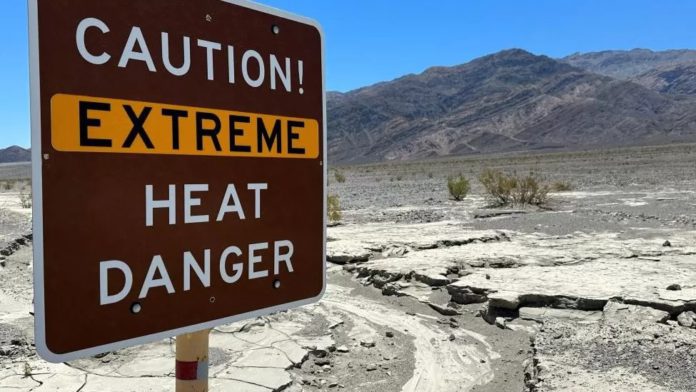A heat dome over the US south-west has translated into extreme heat warnings from coast to coast, which continue to affect more than 110 million people.
Temperature records could be broken in as many as 38 cities.
In Las Vegas, the intense heatwave is threatening on Sunday to break or tie the city’s record high of 117F (47.2C).
It comes as soaring temperatures are also hitting southern Europe and Canada is battling the worst season of wildfires in its history.
Scientists have long warned that climate change linked to human activities will lead to an increase in the severity and frequency of extreme weather events.
Elsewhere in the south-western US, hundreds of firefighters have been battling brush fires in blistering heat and low humidity on the outskirts of Los Angeles.
Temperatures in Death Valley in California hit 128F (53.9C) on Sunday, according to the National Weather Service (NWS). It is the site of the hottest temperature ever reliably recorded on Earth: 134F (56.7C).
The usually crowded streets of Las Vegas are considerably emptier than normal, and security guards are guarding the fountains of upscale casinos and hotels to prevent people from jumping in.
El Paso, in Texas, has seen temperatures of 100.4F (38C) and above for more than a month now, with no respite in sight.
The city of Phoenix, which has been experiencing temperatures above 109.4F (43C) for 17 days in a row, was granted some modest reprieve on Sunday by a thick cloud cover, which was expected to keep the temperature around 115F (46.1C).
But the heat is set to continue for the foreseeable future, and authorities are warning that vulnerable people – including children, pregnant women and the elderly – are at serious risk of heat-related illness.
Mobile clinics report treating homeless people suffering from third-degree burns. Public buildings in some parts of California and Nevada have been turned into “cooling centres” where people can take refuge from the heat.
A heat dome occurs when an area of high pressure pushes air towards the ground, compressing it and causing it to heat. The warmer air then rises again, setting up a cycle in which air sinks through the centre of the ‘dome’ and rises up its sides.
The pressure also prevents other weather systems that would cool the area – such as rain clouds – from forming.
The NWS has said that the current system in the southwestern US is “one of the strongest” of its kind to hit the region.
The Weather Channel has said the dome will expand across the nation’s south by the middle of next week – meaning other southern US states will see temperatures rise.
Meanwhile, other parts of the US are bracing themselves for severe thunderstorms and flash floods – and north-eastern states could experience another bout of poor air quality as a result of the continuing wildfires in Canada.
“As if the rain coming out of the sky isn’t enough, if you start looking up tomorrow, you’re going to see a similar situation in what we had a couple of weeks ago because of the air quality degradation [from the wildfires],” New York governor Kathy Hochul said at a press conference. “And as I said before, this is possibly our new normal.”
The world has already warmed by about 1.1C since the industrial era began and temperatures will keep rising unless governments around the world make steep cuts to emissions.


